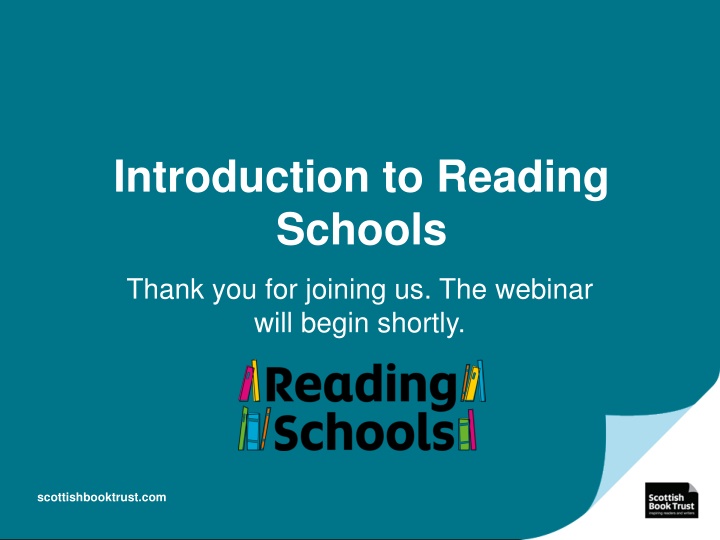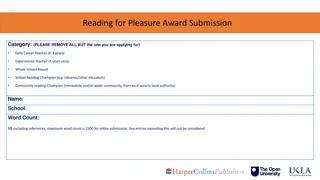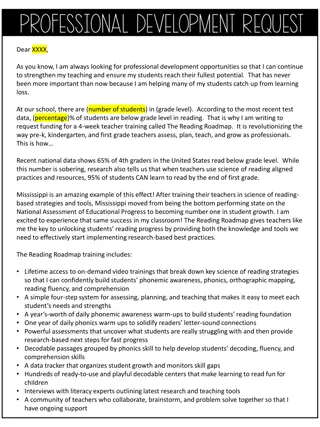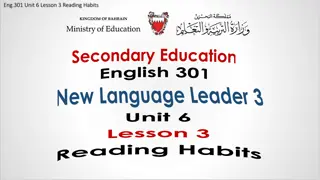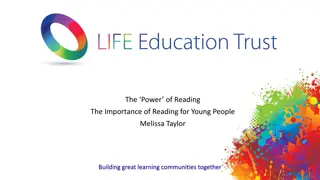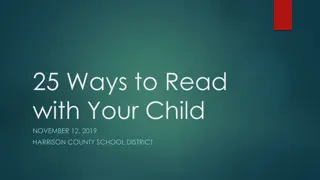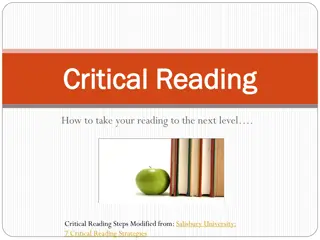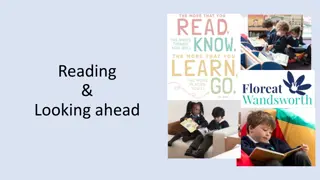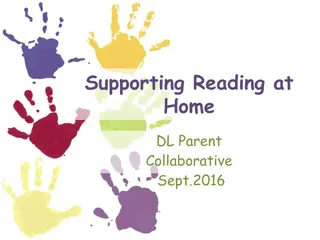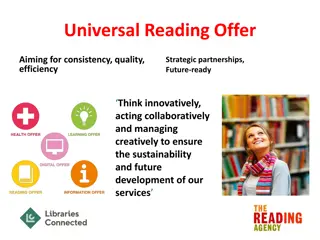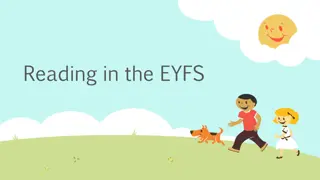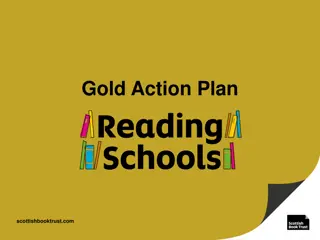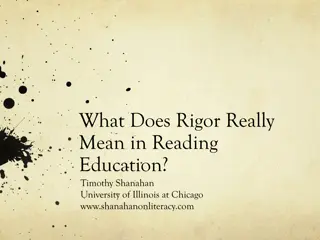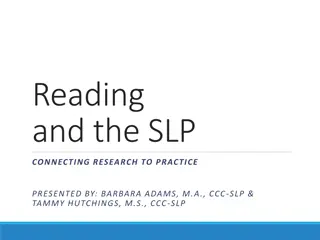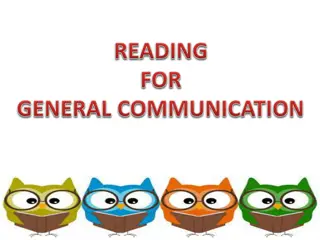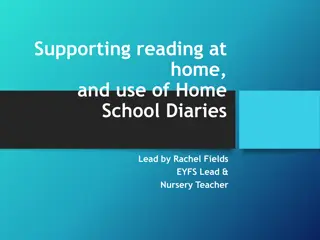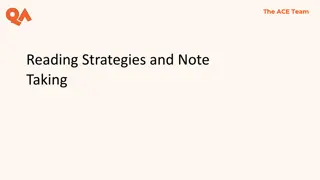Importance of Reading for Pleasure in Education
Reading for pleasure plays a crucial role in shaping a child's future success, impacting educational attainment, empathy development, and overall well-being. The webinar hosted by Scottish Book Trust focuses on promoting a love for reading, emphasizing the benefits it offers, and showcasing the Reading Schools programme to encourage wider participation. Expert speakers delve into the transformative power of books, emphasizing the profound impact of fostering a culture of reading for pleasure. Join the session to discover how reading can inspire creativity, improve academic performance, and promote social and emotional growth.
Download Presentation

Please find below an Image/Link to download the presentation.
The content on the website is provided AS IS for your information and personal use only. It may not be sold, licensed, or shared on other websites without obtaining consent from the author.If you encounter any issues during the download, it is possible that the publisher has removed the file from their server.
You are allowed to download the files provided on this website for personal or commercial use, subject to the condition that they are used lawfully. All files are the property of their respective owners.
The content on the website is provided AS IS for your information and personal use only. It may not be sold, licensed, or shared on other websites without obtaining consent from the author.
E N D
Presentation Transcript
Introduction to Reading Schools Thank you for joining us. The webinar will begin shortly. scottishbooktrust.com
Todays session Joining us today: Clara Owen, Reading Schools Co-ordinator Liam McCallum, Reading Schools Project Manager Special guest: Trudi Palmer, Priorsford Primary School Session outline: The importance of reading for pleasure An introduction to the Reading Schools programme Interview with our guest speaker on their Reading Schools journey The impact of Reading Schools participation Next steps to get involved Questions scottishbooktrust.com
Scottish Book Trust We are a national charity that has been bringing the transformational benefits of reading and writing to everyone in Scotland since 1998. We believe books, reading and writing have the power to change lives. A love of reading inspires creativity, improves employment opportunities, mental health and wellbeing and is one of the most effective ways to help break the poverty cycle. scottishbooktrust.com
Reading for Pleasure Reading for pleasure is the single most important indicator of a child s future success. Reading offers: Comfort and connection Insight and understanding into other worlds and experiences Escapism Can reduce stress and anxiety Models of good social skills A soothing wind-down to help us to sleep better Reading is a social and emotional investment, with the potential for invaluable returns. scottishbooktrust.com
Reading for Pleasure: attainment The Organisation for Economic Co-operation and Development found that whether or not a child enjoys reading is more important to their educational success than their family background OECD. (2002). Reading for change: performance and engagement across countries: results from PISA 2000. Paris: OECD Publishing. The 2009 PISA survey (OECD, 2010) shows that increasing reading engagement could mitigate 30% of the attainment gap associated with socio-economic disadvantage. Sosu, E., & Ellis, S. (2014). Closing the attainment gap in Scottish education. York: Joseph Rowntree Foundation. It was found in one study of high school students in the USA that those who said they read for pleasure showed higher grade averages in not only English, but also Mathematics and Science subjects . Whitten et al., (2016) scottishbooktrust.com
Reading for Pleasure: empathy A 2016 study found that gaining an understanding of different people, countries and cultures was seen to be the number one emotional benefit of reading, with as many as 57% of people agreeing that reading makes them interested in the world outside their own. Billington, J. (2016). The untold power of the book. London: Reading Agency. Two thirds of readers report strong empathy versus less than half of non- readers (48%). What s more, people who read for just 30 minutes a week are 23% more likely to understand other people s feelings. Billington, J. (2015). Reading between the lines: the benefits of reading for pleasure. Liverpool: University of Liverpool. scottishbooktrust.com
Reading for Pleasure: self- esteem and mental health The Millennium Cohort Study found that reading for pleasure increases self-esteem at age 11, regardless of demographic, socioeconomic, and familial confounders. Mak, H.W., & Fancourt, D. (2019). Arts engagement and self esteem in children: results from a propensity score matching analysis. Ann. N.Y. Acad. Sci. 1449, 36-45. Children who are the most engaged with literacy are three times more likely to have higher levels of mental wellbeing than children who are the least engaged Clark, C., & Teravainen-Goff, A. (2018). Mental wellbeing, reading and writing. London: National Literacy Trust. scottishbooktrust.com
Recovery planning The majority of participants held the view that school building closures had a negative effect on pupil progress and attainment. Children and young people who were most negatively affected by school building closure included those adversely affected by poverty. (Education Scotland, Pupil Equity Audit) There has been a massive gap for the pupils who were in P1, now in P2. They missed that golden period of learning to read. (Education Scotland, Pupil Equity Audit) 92% of teachers think school closures (due to Covid-19) have contributed to a widening of the word gap. (Oxford Language Report) scottishbooktrust.com
What is Reading Schools? An accreditation framework to recognise and reward schools for building and sustaining a whole-school reading culture in their setting. Easy Valuable Empowering Prestigious Community Fun scottishbooktrust.com
Reading Schools offers An accreditation for every school ; at Core, Silver and Gold A coherent structure for all your reading initiatives A framework mapped to HGIOS 4 to support school improvement and HMIE inspections Scottish Book Trust resources, training and support Professional development and leadership opportunities Ways to champion learner voice, leadership and confidence Opportunities for collaboration within and across schools Pathways to engaging your families and wider community scottishbooktrust.com
The journey so far 2019: Phase 1 pilot with 34 schools in FVWL 2020: Phase 2 pilot in Stirling, Dundee, Perth + Kinross and Angus 2021: Dedicated www.readingschools.scot website launches 2021-22: Strategic roll-out in FVWL, Tayside and West Partnership 2022-23: National roll-out to all schools in Scotland 2023: 370+ accreditations (and counting!), 507 schools working towards accreditation Through engaging in the Reading Accreditation pilot, teachers and learners are supported to foster and develop that love of reading that we want for all our children, in a dynamic, structured and exciting way. - M. Cochrane, West Lothian scottishbooktrust.com
How it works Core: the foundational work key to building a reading culture in school, focused on sustainable reading routines and the school environment Silver: additional opportunities for broadening learners experiences, e.g., engaging with authors, visiting libraries, and bringing in outside expertise Gold: sharing your enthusiasm and expertise with your community through, for example, intergenerational book projects or local partnerships with other schools and businesses scottishbooktrust.com
What it looks like Website Dashboard Framework Action Plan Evidence Plan Comment Photos Quotes Accreditation scottishbooktrust.com
The framework Reader role modelling Staff development School environment Access to high quality books Interdisciplinary book projects Creating social networks Engaging with authors Responding to reading Raising the profile of reading with families Rewarding progress and recognising personal achievements 1.2 Leadership of Learning 1.3 Leadership of Change 1.5 Management of resources to promote equity 2.2 Curriculum 2.3 Learning, Teaching and Assessment 2.5 Family Learning 2.7 Partnerships 3.2 Raising Attainment and Achievement The framework is robust and relevant flexible enough to encompass a whole array of different approaches within individual schools and authorities Dr Janet Adam, FVWL RIC scottishbooktrust.com
The framework: how it works Teacher knowledge of children's literature is the cornerstone of effective reading for pleasure practice in school Professor Teresa Cremin, OU scottishbooktrust.com
Opportunities Links with local schools Community events Author tours Prizegivings And more..! scottishbooktrust.com
Interview Section Special Guest Trudi Palmer Priorsford Primary School scottishbooktrust.com
Impact of participation On staff: 'From making it the heart of our reading culture in each classroom, to encouraging and sharing a love of reading with the community, our work has underpinned our drive to make [our school] a Reading School. From working with individuals to whole stages across more than one school, we have all benefitted from being part of the programme. We have seen improvements in attainment, attitudes and participation which have meant not only has the work been successful, but sustainabletoo. - Head Teacher, Primary School On learners: 'I have gained so much confidence and become so proud of the fact that I enjoy reading [. . .] I also thoroughly enjoyed the aspect of interacting with younger pupils, and it felt empowering to leave them with inspiration on what to read but also who to be when they are S6s themselves. - S6 Reading Leader, Secondary School scottishbooktrust.com
A clear map for improvement We were recently inspected by HMIE and they spent quite a significant amount of time talking to us about the Reading Schools programme and how our young people, staff and community were benefitting from it; they absolutely loved the fact that the school was devoting so much time and energy to this project and was reaping the benefits. - Linda Nisbet, Whitburn Academy scottishbooktrust.com
Evidence from Reading Schools evaluation: attainment 'A P7 boy, who lives in one of the more socially deprived areas of the village, had very little interest in reading. We have struggled throughout his primary years to engage him, and this has impacted his attainment and opportunities for success. The drive to increase library membership is what has impacted him. He lives near the library, so he now gets off the bus a stop early and visits the library regularly on his way home from school. He loves to show his latest new book and the increase in the amount he reads has been significant. He is "hooked"! This in turn has increased his attainment and he is now reading at expected levels and is in a strong position for moving on to find success in high school.' scottishbooktrust.com
Evidence from Reading Schools evaluation: wellbeing 'They re consuming more than just the words. They re able to really understand the underlying message and they re learning that emotional language. They re able to explain what they re feeling and why they re feeling it much more. Parent scottishbooktrust.com
Evidence from Reading Schools evaluation: inclusion 'We have a boy who moved from overseas last year. Due to having EAL he can struggle with literacy tasks, and this can negatively impact on his behaviour. We have introduced lots of graphic novels and picture books to the class. Recently we were reading The Arrival by Shaun Tan. When we went on to discuss the book, the insight this child had and the inferences he had deduced were astute. Through discussion, it was clear he was able to analyse the images and interpret the meanings on a relatively deep level. His lived experience of moving to a strange land made him the expert. It was wonderful to see him so engaged and animated in this lesson. scottishbooktrust.com
Evidence from Reading Schools evaluation: resilience 'One of our learners in P5 has ADHD and although she has well-developed reading skills she does not choose to read in school. During our 'softstart' she would often have disagreements with others and would not always make good choices with regards to behaviour. This often meant she did not have a positive start to the day. Through our 'Reading Volunteer' project she now loves to read to younger pupils in the morning. She puts on her lanyard and goes off to classes to find others who would like to hear a story. She enjoys talking to the younger pupils, talking to them about book choices and organising them so they are ready to listen to the story. She has a purpose to this time now and has a sense of responsibility. Her class teacher noted she is more willing to read in class and is really ready to begin her learning each day.' scottishbooktrust.com
Next steps to get started Visit www.readingschools.scot Explore the framework Take our level quiz to decide which accreditation best suits your school Add Reading School accreditation to your school improvement planning Form your Reading Leadership Group with students and staff Plan your CLPL calendar Start your accreditation journey! scottishbooktrust.com
Upcoming Reading Schools CLPL The Reading Schools journey: As it Happens Wednesday 6 September, 16.30-17.30 Submitting your Evidence Thursday 28 September, 16.30-17.30 Shared practice events: Paired reading projects with Read, Write, Count Monday 25 September, 16.30-17.30 and Monday 2 October, 16.30-17.30 Interdisciplinary book projects Thursday 16 November, 16.30-18.00 Drop-in sessions (16.00-17.00): Thursday 21 September Thursday 2 November Thursday 30 November Other Scottish Book Trust CLPL: Building a reading culture in your classroom Tuesday 19 September, 16.30-17.30 scottishbooktrust.com
Any questions..? Pop them in the chat or unmute and speak with us! scottishbooktrust.com
We appreciate your feedback Please take a second to complete our quick survey here: https://www.surveymonkey.co.uk/r/L 73CYQV You can find details of the recent changes we've made based on your feedback on our website! scottishbooktrust.com
Thank you liam.mccallum@scottishbooktrust.com clara.owen@scottishbooktrust.com readingschools@scottishbooktrust.com Scottish Book Trust is a national charity changing lives through reading and writing. Registered company SC184248 | Scottish charity SC027669
